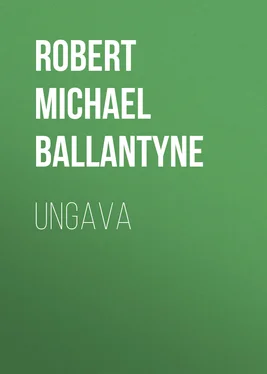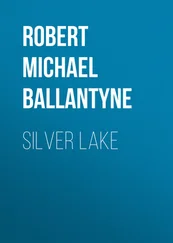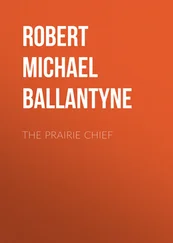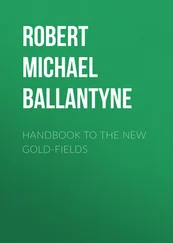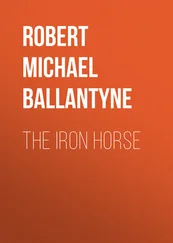Robert Michael Ballantyne - Ungava
Здесь есть возможность читать онлайн «Robert Michael Ballantyne - Ungava» — ознакомительный отрывок электронной книги совершенно бесплатно, а после прочтения отрывка купить полную версию. В некоторых случаях можно слушать аудио, скачать через торрент в формате fb2 и присутствует краткое содержание. Жанр: Детские приключения, literature_19, foreign_antique, foreign_prose, foreign_children, на английском языке. Описание произведения, (предисловие) а так же отзывы посетителей доступны на портале библиотеки ЛибКат.
- Название:Ungava
- Автор:
- Жанр:
- Год:неизвестен
- ISBN:нет данных
- Рейтинг книги:3 / 5. Голосов: 1
-
Избранное:Добавить в избранное
- Отзывы:
-
Ваша оценка:
- 60
- 1
- 2
- 3
- 4
- 5
Ungava: краткое содержание, описание и аннотация
Предлагаем к чтению аннотацию, описание, краткое содержание или предисловие (зависит от того, что написал сам автор книги «Ungava»). Если вы не нашли необходимую информацию о книге — напишите в комментариях, мы постараемся отыскать её.
Ungava — читать онлайн ознакомительный отрывок
Ниже представлен текст книги, разбитый по страницам. Система сохранения места последней прочитанной страницы, позволяет с удобством читать онлайн бесплатно книгу «Ungava», без необходимости каждый раз заново искать на чём Вы остановились. Поставьте закладку, и сможете в любой момент перейти на страницу, на которой закончили чтение.
Интервал:
Закладка:
To the right of the tent was placed the small canoe, bottom up, so as to afford a partial protection to the bedding which Oostesimow was engaged in spreading out for Frank and himself and his comrade Ma-Istequan. Facing this, at the other side of the fire, and on the left of the tent, the largest canoe was turned up in a similar manner, and several of the men were engaged in covering the ground beneath it with a layer of leaves and branches, above which they spread their blankets; while others lounged around the fire and smoked their beloved pipes, or watched with impatient eyes the operations of Bryan, who, being accustomed to have familiar dealings with the fire, had been deemed worthy of holding the office of cook to the men, and was inducted accordingly.
It is due to Bryan to say that he fully merited the honour conferred upon him; for never, since the days of Vulcan, was there a man seen who could daringly dabble in the fire as he did. He had a peculiar sleight-of-hand way of seizing hold of and tossing about red-hot coals with his naked hand, that induced one to believe he must be made of leather. Flames seemed to have no effect whatever on his sinewy arms when they licked around them; and as for smoke, he treated it with benign contempt. Not so La Roche: with the mercurial temperament of his class he leaped about the fire, during his culinary operations, in a way that afforded infinite amusement to his comrades, and not unfrequently brought him into violent collision with Bryan, who usually received him on such occasions with a strong Irish growl, mingled with a disparaging or contemptuous remark.
Beyond the circle of light thrown by the fire was the belt of willows which encompassed the camp on all sides except towards the sea, where a narrow gap formed a natural entrance and afforded a glimpse of the ocean with its fields and hummocks of ice floating on its calm bosom and glancing in the faint light of the moon, which was then in its first quarter.
“How comfortable and snug everything is!” said Mrs Stanley, as she poured out the tea, while her husband carved the duck.
“Yes, isn’t it, Eda?” said Frank, patting his favourite on the head, as he held out her plate for a wing. “There, give her a bit of the breast too,” he added. “I know she’s ravenously hungry, for I saw her looking at Chimo, just before we landed, as if she meant to eat him for supper without waiting to have him cooked.”
“O Frank, how can you be so wicked?” said Eda, taking up her knife and fork and attacking the wing with so much energy as almost to justify her friend’s assertion.
“Snug, said you, Jessie? yes, that’s the very word to express it,” said Stanley. “There’s no situation that I know of (and I wasn’t born yesterday) that is so perfectly snug, and in all respects comfortable, as an encampment in the woods on a fine night in spring or autumn.”
“Or winter,” added Frank, swallowing a pannikin of tea at a draught, nodding to Chimo, as much as to say, “Do that if you can, old fellow,” and handing it to Mrs Stanley to be replenished. “Don’t omit winter—cold, sharp, sunny winter. An encampment in the snow, in fine weather, is as snug as this.”
“Rather cold, is it not?” said Mrs Stanley.
“Cold! not a bit,” replied Frank, making a reckless dive with his hand into the biscuit-bag; “if you have enough wood to get up a roaring fire, six feet long by three broad and four deep, with a bank of snow five feet high all around ye, a pine-tree with lots of thick branches spreading overhead to keep off the snow, and two big green blankets to keep out the frost—(another leg of that widgeon, please)—you’ve no notion how snug it is, I assure you.”
“Hum!” ejaculated Stanley, with a dubious smile, “you forgot to add—a youthful, robust frame, with the blood careering through the veins like wildfire, to your catalogue of requisites. No doubt it is pleasant enough in its way; but commend me to spring or autumn for thorough enjoyment, when the air is mild, and the waters flowing, and the woods green and beautiful.”
“Why don’t you speak of summer, papa?” said Eda, who had been listening intently to this conversation.
“Summer, my pet! because—”
“Allow me to explain,” interrupted Frank, laying down his knife and fork, and placing the forefinger of his right hand in his left palm, as if he were about to make a speech. “Because, Eda, because there is such a thing as heat—long-continued, never-ending, sweltering heat. Because there are such reprehensible and unutterably detestable insects as mosquitoes, and sand-flies, and bull-dogs; and there is such a thing as being bitten, and stung, and worried, and sucked into a sort of partial madness; and I have seen such sights as men perpetually slapping their own faces, and scratching the skin off their own cheeks with their own nails, and getting no relief thereby, but rather making things worse; and I have, moreover, seen men’s heads swelled until the eyes and noses were lost, and the mouths only visible when opened, and their general aspect like that of a Scotch haggis; and there is a time when all this accumulates on man and beast till the latter takes to the water in desperation, and the former takes to intermittent insanity, and that time is— summer .—Another cup, please, Mrs Stanley. ’Pon my conscience, it creates thirst to think of it.”
At this stage the conversation of the party in the tent was interrupted by a loud peal of laughter mingled with not a few angry exclamations from the men. La Roche, in one of his frantic leaps to avoid a tongue of flame which shot out from the fire with a vicious velocity towards his eyes, came into violent contact with Bryan while that worthy was in the act of lifting a seething kettle of soup and boiled pork from the fire. Fortunately for the party whose supper was thus placed in jeopardy, Bryan stood his ground; but La Roche, tripping over a log, fell heavily among the pannikins, tin plates, spoons, and knives, which had been just laid out on the ground in front of the canoe.
“Ach! mauvais chien,” growled Gaspard, as he picked up and threw away the fragments of his pipe, “you’re always cuttin’ and jumpin’ about like a monkey.”
“Oh! pauvre crapaud,” cried François, laughing; “don’t abuse him, Gaspard. He’s a useful dog in his way.”
“Tare an’ ages! you’ve done it now, ye have. Bad luck to ye! wasn’t I for iver tellin’ ye that same. Shure, if it wasn’t that ye’re no bigger or heavier than a wisp o’ pea straw, ye’d have druve me and the soup into the fire, ye would. Be the big toe o’ St. Patrick, not to mintion his riverince the Pope—”
“Come, come, Bryan,” cried Massan, “don’t speak ill o’ the Pope, an’ down wi’ the kettle.”
“The kittle, is it? Sorra a kittle ye’ll touch, Massan, till it’s cool enough to let us all start fair at wance. Ye’ve got yer mouth and throat lined wi’ brass, I believe, an’ would ate the half o’t before a soul of us could taste it!”
“Don’t insult me, you red-faced racoon,” retorted Massan, while he and his comrades circled round the kettle, and began a vigorous attack on the scalding mess; “my throat is not so used to swallowin’ fire as your own. I never knowed a man that payed into the grub as you do.—Bah! how hot it is.—I say, Oolibuck, doesn’t it remember you o’ the dogs o’ yer own country, when they gits the stone kettle to clean out?”
Oolibuck’s broad visage expanded with a chuckle as he lifted an enormous wooden spoonful of soup to his ample mouth. “Me tink de dogs of de Innuit (Esquimaux) make short work of dis kettle if ’e had ’im.”
“Do the dogs of the Huskies eat with their masters?” inquired François, as he groped in the kettle with his fork in search of a piece of pork.
Читать дальшеИнтервал:
Закладка:
Похожие книги на «Ungava»
Представляем Вашему вниманию похожие книги на «Ungava» списком для выбора. Мы отобрали схожую по названию и смыслу литературу в надежде предоставить читателям больше вариантов отыскать новые, интересные, ещё непрочитанные произведения.
Обсуждение, отзывы о книге «Ungava» и просто собственные мнения читателей. Оставьте ваши комментарии, напишите, что Вы думаете о произведении, его смысле или главных героях. Укажите что конкретно понравилось, а что нет, и почему Вы так считаете.
